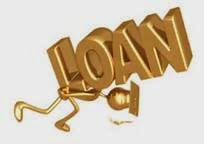Title : Types Of Loan
There are many types of bank loans available. The most common types are home loans (both fixed and adjustable rate), credit cards, student loans, business loans in several different forms, and personal loans.
Loans made on collateral--such as car loans and home mortgages--have a security attached to the loan. For example, if a customer stops paying on his car loan, the bank will repossess the car to protect their interest. The car is then sold to recover the outstanding balance of the loan. The same thing happens when a home goes into foreclosure.
Unsecured loans have no security attached to the loan, and therefore the bank is less protected. Unsecured loans include credit cards, signature loans and student loans. In the case of default on an unsecured debt, the bank may sue the customer to recover the funds. Yet, in reality, the only legal recourse the bank really has is to damage the defaulting customer's credit rating.
For a new business, any business loans attained will probably require a personal guarantee, known as a PG. Even though the loan is in the name and tax ID number of the business, the business owner or business officers must personally guarantee the repayment of the loan. In other words, if the business defaults on the loan, the business owner or officers become personally liable for the repayment of the loan.
Considerations
Before applying for a bank loan, a bank customer must consider how much the loan will ultimately cost by totaling the principal and interest payments over the term of the loan. He should decide whether it would be a better idea to just save the money and not take out the loan. In the case of a home loan, this is not realistic for most people, but saving money for a larger down payment can lower the interest rate on a home loan.
Warning
Do not take out a bank loan if you do not have the ability to repay the loan. In the case of home loans, delinquent payments can result in foreclosure. Likewise, in the case of car loans, delinquent payments can result in the repossession of the vehicle. Aside from the obvious embarrassment a situation like this causes, it also does lasting damage to your credit rating. A home foreclosure can stay on your credit report for up to ten years.
Keep reading my articles for more updates on LOANS
Thanks,
Surbhi Maheshwari [MBA Fin / Mktg ]
Manager Finance
On Line Assistence :
Gtalk : SurbhiM.AeroSoft@gmail.com
















